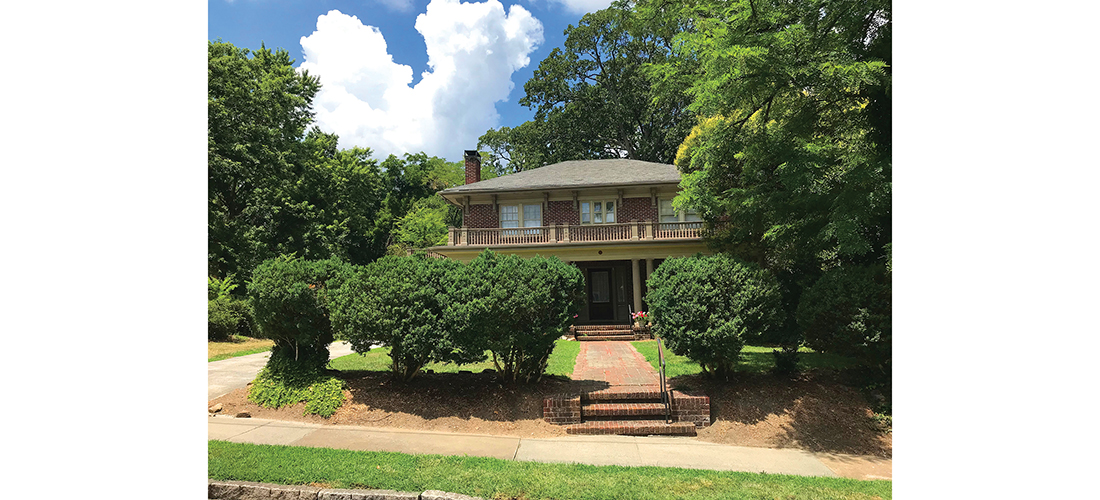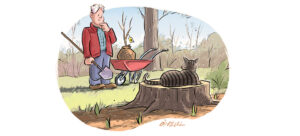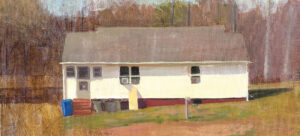
The Greene Street Music Scene
Hellraiser Haus raised no hell, but elevated musicians
By Billy [Eye] Ingram
“It was a killer spot in a strangely ideal location. One of the fanciest neighborhoods in town but with no actual neighbors at night. I still imagine that yard all packed out, a crowd sprawling out onto Greene Street.” — Katei Cranford
When I read about First Presbyterian Church’s plan to bring down one or more of the houses on Greene Street directly across from the chapel’s western entrance, I was relieved to discover those demolition plans did not include 711 Greene, known to a generation of Gate City indie music lovers as Hellraiser Haus.
For a fleeting moment in time, this cavernous four-bedroom, brick home was a DIY live concert stage, so named because there’s an exterior shot of the nearby church in one of the schlockiest movies ever made, Hellraiser III: Hell on Earth, where Greensboro (particularly around Lewis and South Elm) and the Triad were supposed to represent New York City. That alone should give you some idea of how laughably inept this unintentionally horrific production was.
Over the last 20 years, various dwellings on the outskirts of downtown and circling our college campuses have doubled as underground punk/experimental music venues — Karate Dungeon, TYP, Dogwood, Dude Ranch and Tuba House, a mid-2010s era crashpad so precarious you half expected The Wicked Witch of the East’s stockinged legs to be jutting out of the foundation.
Remind me sometime to tell you about running from the police with 9 inches of snow on the ground then taking refuse at Tuba House . . . on second thought, never mind.
Ironically, given the name, the most civilized of these rhythmic refuges was Hellraiser Haus. “I moved in around 2012 so [711 Greene] served as a music venue from then until 2018,” Ryan Stack tells me. “We were mid-20s kids living in that house, surrounded by a church across the street, a separate church to the left of the house, an outreach center. It was in a wealthy neighborhood and for some reason that house went to a bunch of kids.”
Stack had played in local bands such as Saucer and R Father for most of his life. “I think small scale venues help prop up larger venues,” he says. “If there’s not a grassroots music scene where you can go and play for cheap or free, then there’s nothing. You can’t build anything up from that.”
“That strip was a little oasis adjacent to downtown,” Yes! Weekly’s maven of music Katei Cranford remembers. “And, lord, that house was fancy. Like a soap opera set in 1980. Something about cracking a PBR on an exquisitely-tiled counter while punk bands thrashed out in the living room like a party scene out of a John Hughes movie — opulence and degeneracy intertwined.”
“Often neighbors walked by with their dogs or whatever,” Stack says. “They would be like, ‘We heard you playing music last night — sounded good.’” Without next-door neighbors, Stack says, they were “just a faint sound and a little bit of flavor in the neighborhood. Never ever got the cops called on us and we were there for about six years.”
Almost every Hellraiser Haus booking featured at least one band on tour, with all of the cash collected at the door going to the performers. “We never took any money,“ Stack says. “We focused on exposing new and young bands, pairing them with larger bands that were out on the road.” Eye attended Hellraiser Haus on a few occasions, most notably around 2017 for Instant Regrets, Bronzed Chorus, Basement Life, Taylor Bays, and The Kneads. The basement hangout was outfitted with a pool table and an arcade set up with dozens of vintage video games.
“There was a band from Japan called Mothercoat that did a really killer set at our house,” Stack recalls. “Ice Balloons with Kyp Malone from TV on the Radio played there. I remember going to work and stepping over him as I came down the stairs cause he was sleeping on the floor. We kept collecting mattresses and bands would come through and be like, ‘I haven’t slept on a mattress in months!’”
When promoter/performer Joe Garrigan revived GSOFest in 2017, Hellraiser Haus was naturally the launchpad: “For touring bands,” Garrigan says, “it was a better situation than playing at a club, then finding a place to crash after the gig.”
Stack fondly recalls his favorite evening, when Fat Wreck Chord label’s Night Birds played. “The place was slammed full,” he says. “The mosh pit got out of control and some dude went flying through the glass front door. He went to the hospital, the show went on, and all those nice punk folk donated exactly enough money to fix the door.”
“We had hip hop, folk shows, metal shows. I never felt like the space was disrespected.” Stack discovered that he and the 10 or 15 individuals living at Hellraiser Haus at various times were in harmonic convergence. “We were trying to do something for the music community,” he says, “and they were fully on board with us when we needed things.”
Shouldn’t be too surprising that Ryan Stack now lives in Glenwood where the music scene has been reignited at Etc.gso, formerly On Pop of the World, on Grove Street, a newly formed artistic collective booking resident powerhouses that never fail to rock, like Instant Regrets and The Old One-Two. World-renowned Eugene Chadbourne, possibly the 10th most famous person from Greensboro, will be performing at Etc.gso on Sunday, September 11.
Joe Garrigan is drummer for longtime grinders The Kneads. They’ll be at Oden Brewery on September 10, along with The Bleeding Hearts and The Eyebrows from Charlotte. Perhaps First Presbyterian could leave a door ajar in case anyone needs a place to crash. OH
Billy Ingram has written 2 books about Greensboro, Hamburger² and his latest, EYE on GSO, has best-seller written all over it. In type so tiny you can’t read it but it’s there.





